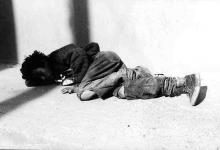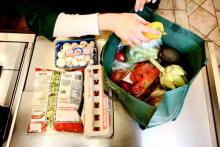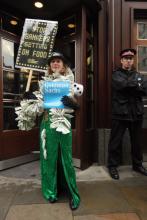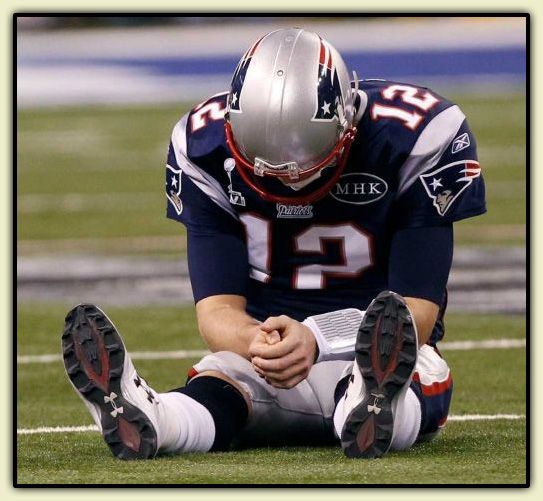Economic Justice

How much water have you used today?
You probably took a shower, used your toilet, brushed your teeth, maybe boiled some for a cup of tea of coffee, not to mention being well on the way to the 64 ounces of water that we’re told to drink every day.
Very quickly the amount of water you’ve used, without even thinking, adds up. Thankfully, water is not a luxury in America, or the developed world in general.
But a new video released by the United Nations Refugee Agency (UNHCR) today paints a stark picture of just how precious and luxurious resource water is in many parts of the world.
If you’re finishing your income tax return this week, here’s some food for thought.
The National Priorities Project provides three helpful graphs of the president’s proposed 2013 budget (see budget dashboard). The discretionary budget, the program spending on which Congress votes; the mandatory budget, programs such as Social Security and Medicare that are outside the budget process; and the total budget, combining the first two. The first graph shows, for instance, that 57 percent of the proposed discretionary budget is for the military.
When you’ve finished your return and know what your tax payment is, here is a calculator that produces a “receipt” showing how it will be spent. For an explanation, see here.
For me, tax time is that once-a-year personal realization that my priorities are not the same as the government’s. And that the political struggle to change the government’s priorities is important.
In a lunchtime speech today before hundreds of reporters and editors attending the annual meeting of the Associated Press, President Obama launched an attack on the House Republican budget passed last week.
“Disguised as a deficit reduction plan, it’s really an attempt to impose a radical vision on our country. It’s nothing but thinly veiled social Darwinism,” Mr. Obama said. “By gutting the very things we need to grow an economy that’s built to last — education and training, research and development — it’s a prescription for decline.”
The House budget would do the reverse of what the country needs. It cuts taxes on the wealthiest, increases military spending, and drastically reduces domestic programs, especially those serving the neediest. As the Center on Budget and Policy Priorities said, “It would likely produce the largest redistribution of income from the bottom to the top in modern U.S. history and likely increase poverty and inequality more than any other budget in recent times (and possibly in the nation's history)."
We need to build understanding as well as skills to break the cycle of poverty, because our obligation as Christians is not just help, it’s love.
Banking used to be an agreement between neighbors, not a transaction between chairmen of the board. It's time for a new set of rules—banking policies for the 99 percent.

Maybe the Affordable Care Act is constitutional and maybe it's not. If it turns out to be constitutional, maybe it's good legislation and maybe it's not. In any case, it's looking increasingly likely that the Supreme Court, come June, will strike down at least the requirement that everyone buy health insurance. And if the mandate goes, two other requirements will most likely go with it: Once again insurers will be able to reject or refuse to renew applicants. And once again Americans with pre-existing conditions will be uninsurable.
Let me tell you four short stories about friends of mine. These are true stories, not hypothetical examples. I have changed nothing but the names of the people involved. I am not arguing on behalf of the constitutionality of the Affordable Care Act. I'm just saying that all of these people had serious problems before it was passed, and some of them are doing much better now because of it.
People lined the steps of the Supreme Court once again today, asking for their voices to be heard on the ongoing healthcare debate. Justices on Monday began their three-day review of President Barack Obama's 2010 Affordable Care Act, which would require U.S. citizens to purchase health insurance or face a penalty.
Thousands gathered starting on Friday for a ticket inside for oral arguments and to stand outside the court in protest, both for and against the plan.

A note from the poet: Two years ago, our church opened its doors and began serving meals to our community. The immense and overwhelming feelings I felt scared me and so I penned them in this poem. Working with the poor among us has been eye-opening and has really pushed me to re-evaluate my thinking and life, for which I am immensely grateful.
~ The Rev. Dr. Martha FrizLanger

Emmanuel shows up on our front porch about once a week. His name means “God with us,” but if there’s anyone on the planet who appears to have been forgotten by the Divine, It’s him. He stands at about 5’4″ and has maybe a handful of teeth left. when he speaks, I catch about half of what he says, but there’s a childish innocence in his eyes that betrays the years of hard living he has endured since then.
Sometimes he offers to do work; sometimes he asks for food. Usually he just wants money. I’ve written before about my struggles with this, as the controlling side of me wants to have a hand in how he spends “my” money. This particular day, he’s looking for fifteen dollars for rent.
“I told you you had to get clean before I’d give you any money man,” I shook my head. “I can give you some food.”
“I’m clean, sir, I’m clean,” he always calls me that, even though he’s nine years older than I am. He was speaking more clearly than usual and his eyes were unusually bright. “Come with me sir. If you’ll drive me to the Catholic Woman’s house, she’ll tell you I’m clean.”

In the Bible, Jesus even goes so far as to say that when we feed the poor, the “least of these,” we are feeding Christ himself. When Jesus speaks of the final judgment he says we will be asked by God, “When I was hungry did you feed me?” Can you imagine if our response was, “Sorry God, the city would not give us a permit?”
One of the stories of the Gospel involves Jesus doing a miracle where he takes a few fish and loaves and multiplies them, feeding hundreds of hungry folks. Jesus didn’t have a health permit to do that outdoor feeding. In fact if Jesus had tried to perform that miracle feeding in Philadelphia under these proposed laws, he would have gotten into serious trouble. As Jesus bids us come and follow – feed the poor, care for the hungry — we are not willing to allow unjust policies to be obstacles to love.

Remember Rep. Paul Ryan’s 2011 budget, The Path to Prosperity? Well, it’s baaa-aaack — and this time the path is smoother and wider and offers a quicker trip to judgment.
Christianity and most of the world’s faith traditions explicitly demand protection for the poor and the preservation of the lives and dignity of all. Well, the Chair of the House Budget Committee, Ryan, high-tails it down his Path, budget rolled in-hand, in the exact opposite direction from those moral commitments.
Bob Greenstein, president of the Center on Budget and Policy Priorities (CBPP), concluded that the Ryan budget “is Robin Hood in reverse — on steroids. It would likely produce the largest redistribution of income from the bottom to the top in modern U.S. history and likely increase poverty and inequality more than any other budget in recent times (and possibly in the nation's history)."
Any responsible budget plan requires a balanced approach that would both increase revenue and reduce spending. This proposal would cut taxes, merely hope for revenue, increase military spending, and slash most everything else that isn’t protected by large corporate interests.

This Thursday, March 22nd, is World Water Day. The April 2012 issue of Sojourners includes Ched Myers’ 'Everything Will Live Where the River Goes', a Bible study on water, God, and redemption.
The following hymn celebrates our need for clean water and the Living Water:
Once a Woman Seeking Water
BEACH SPRING 8.7.8.7. D (“God, Whose Giving Knows No Ending”)
Once a woman seeking water at a well not far from home
Met a thirsty, waiting stranger from a people not her own.
Would she give a drink of water and respond to human need?
Could she know the joy and wonder she, the giver, would receive?...

I love great food. Last night, I made fresh linguini with organic whole wheat flour and local, free-range eggs, and topped them with from-scratch meatballs made with organic beef, fresh parsley from my garden, fresh Parmesan--you get the idea. And in a few days, I’ll be celebrating a special occasion at one of the finest restaurants in the Northeast, where the produce is local and seasonal and sustainable and where the experience of eating is a little like visiting a museum of fine arts where you get to taste all the masterpieces. And yesterday, I planted the first spring vegetables in my garden. I’m a member of Slow Food USA, for cryin’ out loud.
I’m just waiting for the James Beard foundation to give me a badge for being such a morally superior eater.
Except I’m not. Because while the way I eat is motivated by certain ethical considerations (including but not limited to concern for the health of the environment and that of animals), I’m aware that my way of eating is an almost miraculous privilege. I can eat this way because I happen to live in a place where I can buy eggs from a neighbor and grow vegetables in my backyard. I don’t have much money, but I have the luxury of time to grow my own vegetables, to cook from scratch, and enough wiggle room in the budget to buy 25 pounds of organic flour in bulk (which makes it cheaper) without running out of money before the end of the month.
In a stunning new book, The American Way of Eating,Tracie McMillan goes undercover in farm fields, in the Wal-Mart produce department, and at Applebee’s to explore common assumptions that food-movement types make about the way many Americans eat: that many of us are overweight and unhealthy because we just don’t “care” enough about the quality of our food--with people who are poor “caring” the least. Throughout the book, which chronicles her numerous conversations with low-wage co-workers, McMillan fiercely defends her conviction that everyone--everyone--wants to eat well.

This morning, Congressman Paul Ryan (R- WI), chairman of the House Budget Committee, released a proposal for an FY 2013 budget. Similar to last year, the plan places an undue burden of deficit reduction on low-income people. Effective anti-poverty programs are targeted for cuts while a tax plan that could significantly reduce tax burdens for top income earners.
According to analysis from Bread for the World:
This FY 2013 budget proposal would have a devastating impact on programs like the Special Supplemental Nutrition Program for Women, Infants, and Children (WIC), the Supplemental Nutrition Assistance Program (SNAP, formerly food stamps), low-income tax credits, and would make international food aid and poverty-focused foreign assistance vulnerable to cuts that would undermine our national security.
The proposed budget would cut SNAP by turning it into a block grant program. This would prevent the program from responding when there is an increase in need. Once the money from the block grant is spent, there cannot be an increase in funds. Currently, SNAP automatically increases with need.

I am on food stamps. This will surprise almost everyone who knows me. I have hidden it from friends, from family, from classmates.
I use self-checkout at the grocery store so I don’t have to face judgment from the cashiers. I read countless posts on Facebook and receive political emails telling me that being on food stamps makes me a degenerate, someone who is dependant and useless. I hear about how I should be kicked off of food stamps so I won’t be so lazy and will get a job.
At the time the economy crashed, I was studying to be a chiropractor. My (now ex-) husband was laid off from his good job. It took him over a year and a half to find a new job. During that time we lost our house and had to declare bankruptcy. Our marriage fell apart.
I’m now a single mom struggling to make ends meet. I was faced with the decision to quit school and go back to work and pray that somehow I’d be able to make the payments on more than $100,000 in student loans or to press on with my education. I prayed about it. I applied for aid. And through the grace of God, I received food stamps.

When I am faced with dishonesty and fraud on a systemic scale, I ask my questions of God. But I am continually directed back to humanity itself to find the origins of injustice.
So what can we do to end injustice?
The Washington Post reported on the massive falsification of documents by banks:
“Employees at major banks who churned out fraudulent foreclosure documents, forged signatures, made up fake job titles and falsely notarized paperwork often did so at the behest of their superiors, according to a federal investigation released Tuesday....
"‘I believe the reports we just released will leave the reader asking one question: How could so many people have participated in this misconduct?’ David Montoya, HUD inspector general, said in a statement. ‘The answer: simple greed.’”

A long-term employee of Goldman Sachs today resigned in the most public of places — The New York Times. Greg Smith, an executive at the banking giant wrote that he was leaving because
the interests of the client continue to be sidelined in the way the firm operates and thinks about making money
and that
the firm has veered so far from the place I joined right out of college that I can no longer in good conscience say that I identify with what it stands for.
The global banking crisis and the ensuing bailouts did a number of things — not least to paint all employees of the big banks with the same brush — they were all money-grabbers, not caring about who they took money from or how they invested it.

Hearing about the injustice and suffering in our world can be overwhelming. The problems seem so insurmountable. Is it really possible to make a difference?
Well, here's some good news. We already are making a big difference. Consider these statistics cited by Dr. Scott Todd from Live58:
"We used to say that 40,000 children die each day from preventable causes. In the 1990s, that number dropped to 33,000 per day. By 2008, it dropped again to 24,000. Now it is down to 21,000. That means that in a generation we cut that number in half. 1.4 billion people live in extreme poverty today. That's a staggering amount, but let's put those numbers in perspective: In 1981, 52 percent of the world lived in extreme poverty. Today it's 26 percent. Again, that means we have cut the number in half, and we did it in one generation."
Now, if you are anything like me then your reaction to poverty is a mixture of compassion and helplessness. If you're reading the Sojourners blog, then I assume that you already care about the least like I do, and that you know how big the problems are. I often find myself asking: What can I do? What can anyone do? We've heard the bleak statistics before. It's not news that there is a problem.
The news is that there is actually hope for real change.

When Marilyn and Larry Johnson sold their computer business in suburban Detroit about a decade ago, they figured they'd settle into the next phase of their lives with ease. Retirement meant more freedom, fewer pressures and ample time on the golf course. But a life of leisure turned out to feel terribly hollow for the Christian couple.
"I remember coming in from a golf game and Larry asking me how my game was, and I just started crying," Marilyn told Detroit Free Press columnist Mitch Albom recently. "I said, 'My life has no purpose.' "
So the Johnsons began volunteering at shelters, treatment programs and soup kitchens. On Thanksgiving eight years ago, they wound up serving turkey dinner to the homeless. It was a turning point. An epiphany.
Two things to consider:
1) On Sunday, the NFL announced that it had increased the salary cap for athletes by $225,000. Last year, players could make $120.375 million dollars per year; this year they can make $120.6 million.
2) The income requirements for an American family of four to be above the poverty limit is $23,050 – a figure nearly one tenth the amount of the .2 percent increase awarded to athletes.
